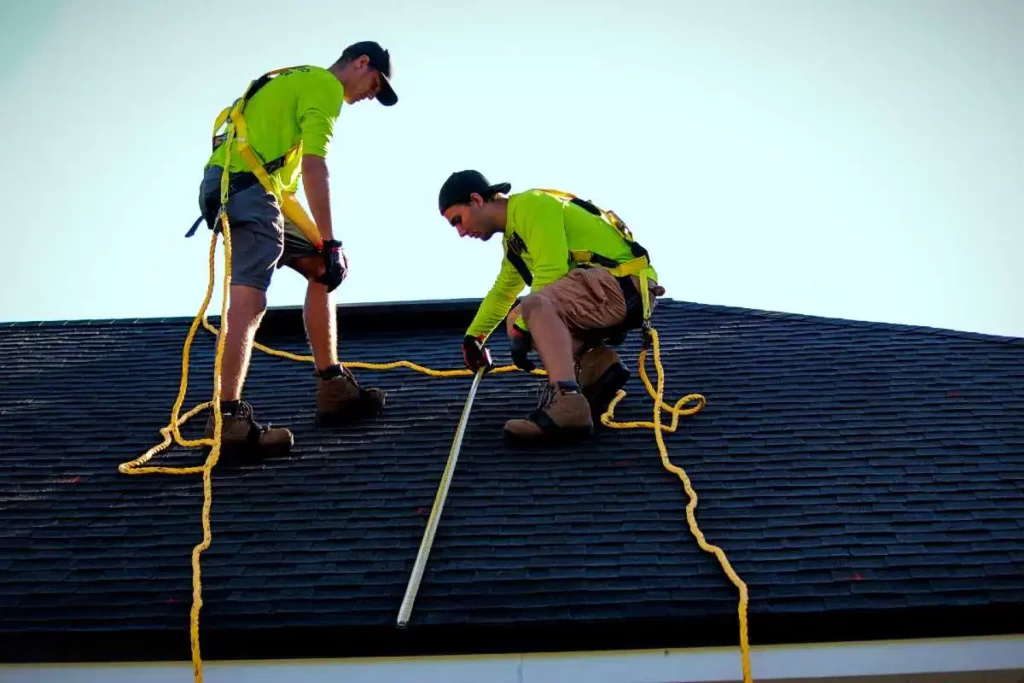Roofers Auckland: How to Identify and Hire the Best Roofing Professionals for Your Home
When it comes to ensuring the longevity and structural integrity of your home, hiring the right roofing professional is paramount. The first and most crucial step in this process is understanding the qualifications that matter when selecting a roofing contractor.
One of the primary qualifications to look for is licensing. A reputable roofing professional such as Roofers Auckland should be licensed to operate in your area. Licensing requirements vary by location, so it's essential to familiarize yourself with the regulations in your specific region. A licensed contractor not only demonstrates a commitment to their craft but also ensures that they meet the necessary standards set by local authorities.
Insurance is another critical qualification. Before hiring a roofing professional, confirm that they carry both liability insurance and workers' compensation coverage. This protects you from potential liabilities in case of accidents or injuries during the project. A lack of insurance could leave you vulnerable to legal and financial repercussions.
Experience plays a pivotal role in the roofing industry. Assessing the experience of a roofing professional involves more than just looking at the number of years they've been in business. Consider the complexity and variety of projects they've undertaken. A seasoned contractor with a diverse portfolio is likely to have the skills and expertise needed for your specific roofing needs.
To gauge the reputation and credibility of a roofing contractor, turn to online reviews, testimonials, and references. Previous clients can provide valuable insights into the contractor's workmanship, communication, and adherence to timelines. Don't hesitate to ask the contractor for references and examples of past projects to get a firsthand look at their capabilities.
The initial consultation is an opportune time to ask pertinent questions. Inquire about the contractor's approach to the project, the materials they recommend, and their timeline for completion. A reliable professional will be transparent and communicative, addressing any concerns you may have.
Ensuring a Licensed and Insured Roofing Contractor
The first step in this process is understanding the licensing requirements in your area. Licensing serves as evidence that the contractor has met the standards set by local authorities. It's an assurance that they are knowledgeable about local building codes and regulations, contributing to the overall quality and safety of the project. Before finalizing any agreements, verify the contractor's license and confirm its validity with the relevant licensing board.
Equally important is insurance. A reputable roofing professional should carry both liability insurance and workers' compensation coverage. Liability insurance protects you from potential damages to your property that may occur during the project. Workers' compensation coverage ensures that you won't be held responsible for any injuries sustained by workers on your property. Requesting proof of insurance is a standard practice and a necessary precaution to shield yourself from potential legal and financial ramifications.
Understanding the significance of insurance requires a closer look at potential risks during a roofing project. Roofing work involves heights, heavy materials, and machinery, making it inherently risky. Without insurance, you may be held liable for accidents or injuries, leading to costly legal battles and potential financial losses. By choosing a contractor with comprehensive insurance coverage, you create a safety net that protects both parties involved.
When vetting potential roofing contractors, don't hesitate to ask about their licensing and insurance status. Reputable Roofers Auckland professionals will willingly provide this information and address any concerns you may have. It's a demonstration of their commitment to transparency and adherence to industry standards.

The Key to Selecting a Seasoned Roofing Professional
Begin by looking beyond the number of years a roofing contractor has been in business. While longevity is a positive indicator, it's equally important to assess the diversity and complexity of the projects they've undertaken. A contractor with a rich and varied portfolio demonstrates adaptability and expertise across different roofing scenarios.
Consider the specific type of roofing work you require and ensure that the professional has experience in that area. Whether it's shingle replacement, roof repairs, or a complete roof installation, a seasoned contractor with a track record in your specific needs is more likely to deliver satisfactory results.
Beyond project diversity, delve into the specifics of a contractor's experience. Ask about their familiarity with different roofing materials, industry trends, and the latest technologies. A roofing professional who stays abreast of advancements demonstrates a commitment to excellence and a willingness to employ the best practices in their work.
References and testimonials from past clients are invaluable when evaluating a contractor's experience. Don't hesitate to request examples of similar projects and inquire about the challenges they encountered and how they were resolved. This insight provides a glimpse into the contractor's problem-solving abilities and overall competence.
A contractor's experience is not only about technical skills but also involves effective communication and project management. Assess their ability to meet deadlines, communicate clearly, and address any concerns that may arise during the project. A contractor who values open communication and client satisfaction is more likely to create a positive and stress-free experience for you.
Navigating the Credibility of Roofing Professionals
Start your assessment by exploring online reviews and testimonials. Platforms like Google, Yelp, or specialized home services websites often feature reviews from previous clients. Reading these reviews can provide valuable insights into the contractor's workmanship, professionalism, and adherence to timelines. Look for patterns in the feedback and pay attention to both positive and negative comments to form a comprehensive understanding.
Seek recommendations from friends, family, or neighbors who have recently undergone roofing projects. Personal recommendations can offer a more nuanced perspective and provide additional details that might not be apparent in online reviews. It's an opportunity to ask specific questions about the contractor's communication, reliability, and the overall experience of working with them.
When vetting a roofing professional, don't hesitate to ask for references. A reputable contractor should be able to provide a list of previous clients who can offer insights into their work. Reach out to these references and inquire about their overall satisfaction, any challenges faced during the project, and how effectively the contractor addressed those challenges.
Transparency is key in building credibility. A reliable roofing professional should be willing to share information about their licenses, insurance, and past projects. If a contractor is hesitant or unwilling to provide such details, it may raise red flags about their credibility.
Essential Questions to Ask Your Roofing Professional
What is Your Experience with Similar Projects?
Begin by understanding the contractor's familiarity with projects similar to yours. Inquire about their experience with your specific roofing needs, whether it's a repair, replacement, or a new installation.
Can You Provide References from Previous Clients?
Requesting references allows you to hear directly from past clients about their experiences with the contractor. A reputable professional should be able to provide references and share examples of successful projects.
How Do You Approach Project Planning and Management?
Understanding the contractor's approach to project planning and management is crucial. Inquire about their timeline, milestones, and how they handle unforeseen challenges that may arise during the project.
What Materials Do You Recommend, and Why?
A knowledgeable roofing professional should be able to recommend materials based on your specific needs and the local climate. Ask about the advantages and disadvantages of different materials to make an informed decision.
What is the Total Cost, and Are There Any Potential Additional Charges?
Clarity on costs is essential. Request a detailed breakdown of the total cost, including labor, materials, and any potential additional charges. This ensures that there are no surprises during or after the project.
Are You Licensed and Insured?
Revisit the basics by confirming the contractor's licensing and insurance. A licensed professional meets local standards, and insurance provides protection for you and the workers in case of accidents.
How Do You Handle Permits and Regulatory Approvals?
Navigating permits and regulatory approvals is part of any roofing project. Ensure that the contractor is familiar with local regulations and can handle the necessary paperwork for a smooth process.
What Safety Measures Do You Implement on the Worksite?
Roofing projects involve inherent risks. Inquire about the safety measures the contractor implements to protect both workers and your property. A commitment to safety is indicative of a professional operation.
How Do You Communicate with Clients Throughout the Project?
Effective communication is crucial for a successful project. Ask about the contractor's communication methods and how they keep clients informed about the progress, any challenges, and changes to the plan.
What Warranty Do You Provide for Your Work?
A warranty is a testament to the contractor's confidence in their work. Inquire about the warranty they offer for both labor and materials, and ensure that the terms are clearly outlined in the contract.

The Role of Insurance in Roofing Projects
Worker's compensation coverage is a crucial component of insurance for roofing projects. Roofing work involves inherent risks, including working at heights and handling heavy materials. In the event of an injury to a worker on your property, worker's compensation coverage ensures that you, as the homeowner, are not held financially responsible. It covers medical expenses and lost wages for injured workers.
Liability insurance is another vital aspect of a roofing professional's insurance coverage. This type of insurance protects you and your property in the event of damage caused by the roofing work. Whether it's damage to your home's structure, landscaping, or personal property, liability insurance provides financial coverage for repairs or replacements. Without this coverage, you could be left with the burden of repair costs.
Roofing projects inherently involve the risk of accidents and damages. Accidental falls, material mishandling, or unforeseen weather events can lead to unexpected challenges. Insurance serves as a safety net, ensuring that both the roofing professional and the homeowner are financially protected in the face of accidents or damages during the project.
Many local jurisdictions require roofing professionals to carry insurance as part of their licensing requirements. Hiring an insured contractor ensures compliance with these regulations, giving you confidence that the contractor meets the necessary standards set by local authorities. It also reflects the contractor's commitment to professionalism and adherence to legal requirements.
For homeowners, insurance provides peace of mind throughout the roofing project. Knowing that the contractor has adequate insurance coverage alleviates concerns about potential liabilities and unexpected costs. It allows you to focus on the project itself, confident that you are working with a professional who prioritizes safety and accountability.
Before finalizing an agreement with a roofing professional, it's essential to verify their insurance coverage. Request a certificate of insurance that clearly outlines their worker's compensation and liability coverage. Confirm the validity of the insurance and ensure that it covers the entire duration of your roofing project.
Insurance coverage is often reflected in the contractual agreement between the homeowner and the roofing professional. The contract should explicitly state the type and amount of insurance coverage held by the contractor. This contractual assurance provides a clear understanding of the protection in place and the responsibilities of both parties.





